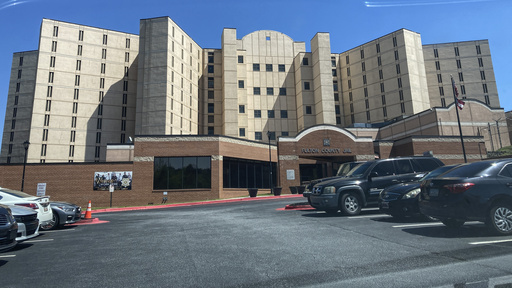
ATLANTA — On Wednesday, a bill was advanced by Republicans in a Georgia Senate committee that would mandate the city of Atlanta to permit the Fulton County sheriff to utilize the city jail for a cost not exceeding its maintenance expenses.
Proponents of the legislation argue that it aims to alleviate the burden on the county jail, which has recently come under scrutiny from a federal civil rights investigation. The investigation revealed alarming living conditions for detainees, indicating that their constitutional rights were being violated. In response, Fulton County and Sheriff Pat Labat entered a court-enforceable agreement last month with the U.S. Department of Justice to enhance the treatment of individuals in county lockups.
Since 2021, there have been a total of thirty-two fatalities in Fulton County custody, as reported by the sheriff’s office. This figure includes two deaths that occurred in the city jail, where the county has already allocated about 350 beds under an existing agreement that permits the usage of up to 700 beds.
Fulton County commissioners have long advocated for the acquisition of Atlanta’s city-owned jail, believing that doing so could significantly mitigate overcrowding and facilitate the categorization of detainees based on assessed danger levels. However, Atlanta Mayor Andre Dickens has firmly stated his refusal to transfer control of the Atlanta City Detention Center.
“I cannot legislatively force the sale of the jail,” expressed Sen. John Albers, the Republican from Roswell who introduced the measure, known as SB 7. Nevertheless, he emphasized that SB 7 would require “that jail to be leased to the county at a very reasonable rate.” The bill was passed with a vote of 5-2, receiving no votes from Democratic members. Opponents of the bill contend that it’s inappropriate for the state to interfere in local affairs, warning that the drive for additional space overlooks the deeper issues of mismanagement and negligence within the county and sheriff’s office, which could perpetuate ongoing problems. Advocates for criminal justice reform argue for a reevaluation of detainment practices, suggesting that law enforcement should focus more on diverting cases towards mental health and social service programs.
Reading the report from the Department of Justice, Terrica Redfield Ganzy, executive director of the Southern Center for Human Rights, remarked on the prevailing sense of indifference that fosters a violent culture. “There is a shocking lack of concern for the health and well-being of anyone within that facility,” she noted.
County Manager Dick Anderson referred to the jail as an “underutilized asset” during a hearing on the bill, suggesting its use could cater to female detainees and individuals with medical or behavioral health challenges. Sheriff Labat echoed this sentiment, mentioning the necessity for additional staffing while recognizing that the issues plaguing the jail run deeper than just space constraints. “We have a cultural change that needs to take place,” he acknowledged.
Sen. Albers expressed a hope that Atlanta and Fulton County would reach a consensus independently, yet he noted that negotiations have not shown promising results. Sen. Sonya Halpern, a Democrat representing Atlanta and a vocal opponent of the bill, believes there are enough stakeholders capable of collaborating to find a solution that allows for increased usage of the facility without state intervention. “We’re making a significant mistake by allowing any city’s assets to be appropriated by counties,” she stated.
Albers referenced previous instances where the state has interceded in local matters, particularly following the establishment of new cities. However, Jim Thornton, director of Governmental Relations for the Georgia Municipal Association, countered this notion, asserting that the matter concerning the jail should remain within local jurisdiction.
Sheriff Labat, who assumed office in January 2021, has previously advocated for a costly new jail, but the Fulton County Board of Commissioners has sidestepped that initiative in favor of directing over $300 million toward renovations, aiming to avoid raising property taxes. The Department of Justice report pointed out that structural issues remain unresolved, and without improved oversight, the jail’s condition may continue to deteriorate.
The investigation by federal authorities was provoked by the death of Lashawn Thompson in 2022, who was discovered in a bedbug-riddled cell within the psychiatric unit of the jail. The report highlighted that officers were aware of the infestation in Thompson’s unit but failed to address it. Additionally, it was revealed that he was deprived of his prescribed medications for psychosis, resulting in significant weight loss during his incarceration.
As of now, the Fulton County jail accommodates fewer than 2,500 detainees, with around 1,600 housed in the principal facility and the remainder in other locations, based on sheriff’s office data. The statistics indicate that 16% of those detained have unindicted cases, a significant decrease from 34% noted in May 2023.

